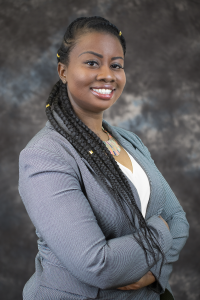 KYLA MCMULLEN, PH.D., EARNS AN EARLY CAREER AWARD FROM THE NATIONAL SCIENCE FOUNDATION TO ENHANCE FIRST RESPONDER EFFECTIVENESS
KYLA MCMULLEN, PH.D., EARNS AN EARLY CAREER AWARD FROM THE NATIONAL SCIENCE FOUNDATION TO ENHANCE FIRST RESPONDER EFFECTIVENESS
First responders typically work in hazardous conditions caused by hurricanes, tsunamis, earthquakes, fires and terrorism events. Natural and man-made disasters are becoming more frequent, making the role of first responders more important than ever. In the case of firefighters, the smoke and darkness that often inhibit vision have left responders plagued by disorientation, miscommunications, getting lost, and failing to identify appropriate paths to reach victims and move them to safety.
Kyla McMullen, Ph.D., an assistant professor in the Department of Computer & Information Science & Engineering at the University of Florida Herbert Wertheim College of Engineering, believes the use of 3D sounds can help firefighters find their way when visual conditions are impeded. With a system developed by McMullen, the responder would hear unique 3D audio cues representing the locations of targets of interest, such as victims, exits, fire panels and water sources.
While 3D audio has been studied before, none of the research has addressed the challenges in designing 3D sound for use in real-world conditions. All existing research results were derived in quiet, highly contrived and tightly controlled experiments. McMullen and her team will be working closely with Gainesville Fire Rescue (GFR) to develop a local, open-source testbed. The team will evaluate firefighters’ performance in search-and-rescue scenarios and will use the results to establish 3D sound design guidelines. The information they garner will address three areas:
- Realistic 3D sound rendering
- Rapid detection of changes in 3D sound
- Effects of competing sounds on accurately distinguishing the sound of interest
The work will significantly contribute to the current understanding of the usability of 3D display systems and human factors associated with using 3D audio to convey spatial information in real-world contexts. McMullen’s research program aims to unobtrusively help first responders perceive the world around them and maintain awareness of their surroundings. This work hopes to decrease the number of casualties experienced each year in emergency environments.
McMullen has integrated an educational component into her research to offer undergraduates the opportunity to work in this intriguing area of research. Students in her 3D audio course will develop supplemental augmented-reality (AR) modules for firefighter emergency medical service (EMS) training. The AR training will allow firefighters to practice EMS skills in a realistic environment outside of the classroom. All students interested in human-centered computing will be recruited to take part in the projects, including students from the Distributed Research Experiences for Undergraduates (DREU) program and the Institute for African-American Mentoring in Computing Sciences (IAAMCS), as well as UF undergraduate students in the Emerging Scholars Program.
A CAREER award is the National Science Foundation’s most prestigious award for junior faculty and is designed to help provide a foundation for a lifetime of scientific leadership.
NSF GRANT WILL AID LOWER-INCOME PH.D. STUDENTS IN THE FIELD OF COMPUTING
McMullen has also received an NSF grant to provide support to Ph.D. students and study the effects on degree-completion and career outlook. This five-year project will address the need for highly qualified computer/information professionals by supporting 30 high-achieving, low-income students with demonstrated financial need who are pursuing doctorate degrees in computing fields. By providing up to five years of scholarship support, as well as mentoring and professional development support, the program aims to overcome barriers faced by low-socioeconomic status students in Ph.D. programs. The objectives of the project are to 1) improve the retention and graduation rates of low-income students in CISE Ph.D. programs, 2) equip Scholars to obtain STEM employment within 12 months of graduation, and 3) improve the culture and climate for diversity and inclusion for CISE Ph.D. students.
Allison Logan
Marketing & Communications Specialist
Herbert Wertheim College of Engineering